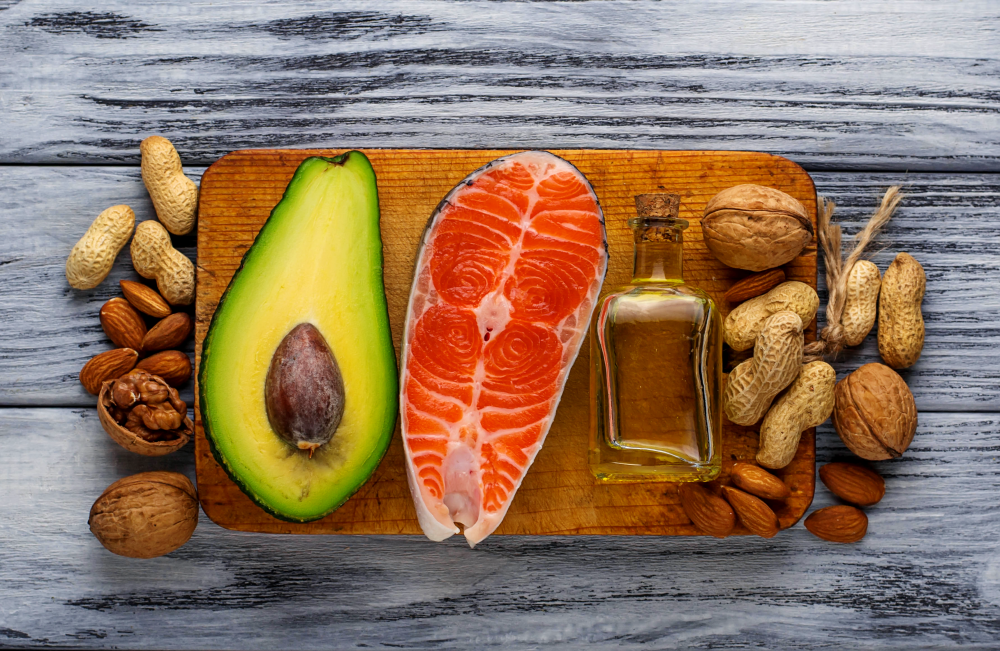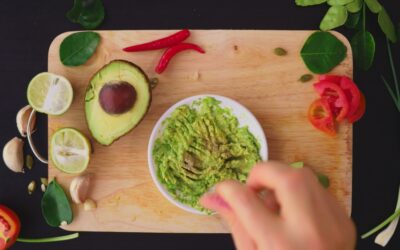Fat is one of three macronutrients found in food that is essential for cell survival in humans. However, it is often demonized as being “unhealthy”. But that couldn’t be further from the truth. Some fats have been linked to improved cognition and decreasing the risk of neurodegenerative disease. With that said, not all fat is created equal. There are two main fat groups.
Saturated fats are found in meat and dairy and unsaturated fats found in vegetable oils, nuts, and fish. Some saturated fats can be harmful if consumed in large amounts. On the other hand, unsaturated fats have significantly greater health benefits.
In this article, you will learn the difference between saturated and unsaturated fats, and how to select the best foods to get the maximum health benefits.
Health Benefits of Dietary Fats
Fat, also called triglycerides, have a number of health benefits.
- Energy: Fats are used for energy once glucose in the blood is depleted. Excess fat gets stored in the fat cells and in the liver. Fat provides 9 calories/ gram and therefore is a more concentrated source of energy compared to carbohydrates and protein (which provide 4 calories/gram). They are an important source of fuel for the body, especially during prolonged exercise or when carbohydrate stores are low.
- Nutrient absorption: Fats are necessary for the absorption of fat-soluble vitamins (A, D, E, and K) and other important nutrients such as carotenoids.
- Hormone production: Fats are essential for the production of hormones, including sex hormones and adrenal hormones.
- Cell membrane structure: Fats are a major component of cell membranes, helping to maintain their structure and function.
- Brain function: Fats are important for brain function, as the brain is composed of about 60% fat. Adequate intake of omega-3 fatty acids, in particular, has been linked to improved cognitive function and a reduced risk of dementia.
- Skin health: Fats are important for maintaining healthy skin, as they help to keep it moisturized and supple.
But as stated earlier, not all fats are created equal, and some types of fats can have negative health effects.
Harms associated with trans fatty acids (trans fat)
Trans fats, also known as partially hydrogenated vegetable oil is far more harmful than saturated fats. The most common type of trans fat is man-made. It’s created through a manufacturing process called hydrogenation and is used to extend the shelf life of food products.
Trans fats are known to:
- Increase LDL cholesterol (bad cholesterol) and decrease HDL cholesterol (good cholesterol) in the blood
- Impair insulin sensitivity: Trans fats may impair insulin sensitivity, which can increase the risk of type 2 diabetes.
- Harmful effects on the brain: Trans fats have been linked to cognitive decline and an increased risk of Alzheimer’s disease.
- No nutritional value: Trans fats provide no nutritional value and are not essential for health.
- Increase inflammation: Trans fats can increase inflammation in the body, which is linked to a variety of health problems, including heart disease, diabetes, and cancer.
The good news is that these fats are so bad they have been ban in most countries. However, there is a little loop hole in the “rules” and if there is less than 0.5 grams/serving, food manufacturers can put “0 grams” on the label.
That said, it is important to recognize the types of foods that may contain these harmful fats and make the effort to avoid them.
Foods that contain potentially harmful amounts of trans fats
- Fast foods—including tater tots, and French fries
- Most spreads—such as margarine spreads or peanut butter
- Snack foods—such as chips, crackers, and cookies
- Fried foods—including fried chicken, onion rings, and nuggets
- Nondairy creamer
- Pre-prepared cake frostings
- Vegetable shortening
- Commercially pre-prepared products, such as pie crusts, pizza dough, and cookie dough
- Pastries, donuts, and pies
“Healthy Fats”
Healthy fats are types of fats that provide important health benefits.
Here are some examples of healthy fats:
Monounsaturated fats
These fats are found in foods such as olive oil, avocados, nuts (such as almonds, cashews, and peanuts), and seeds (such as pumpkin and sesame seeds). They can help to lower LDL (bad) cholesterol levels and reduce the risk of heart disease.
Polyunsaturated fats
These fats are found in foods such as fatty fish (such as salmon, mackerel, and sardines), flaxseeds, chia seeds, and walnuts. They are important for brain function and can help to reduce inflammation in the body.
Omega-3 fatty acids
These are a type of polyunsaturated fat that are particularly important for heart health and brain function. They are found in fatty fish, flaxseeds, chia seeds, and walnuts.
Saturated fats
While saturated fats have been traditionally considered unhealthy, recent research suggests that some types of saturated fats (such as those found in coconut oil and grass-fed butter) may have health benefits when consumed in moderation.
It’s important to note that all fats are high in calories, so it’s important to consume them in moderation as part of a balanced diet. Aim to replace unhealthy fats (such as trans fats and saturated fats from processed foods) with healthy fats from whole foods.
Other articles you may be interested in:
Pelvic Organ Prolapse: What You Need To Know
Around 40% of women worldwide experience pelvic organ prolapse. Most of them are between 60 and 75 years old. While it is common in those who are assigned female at birth (AFAB), it can also occur in people with penises. Though it isn’t infectious, it’s an epidemic in...
Tea-rific Health Benefits of Drinking Green Tea
Around 600,000 tonnes of green tea is consumed annually — a figure that has grown by approximately 20% in the last ten years. When you understand all the benefits of drinking green tea, its popularity isn’t surprising at all. This grassy, flowery, and earthy...
The power of protein on weight management
Weight management can be a challenging journey for many individuals, but with the right approach, achieving a healthy and sustainable weight is possible. Among the various factors that influence weight loss success, the role of protein cannot be overstated. Protein is...
Progressive Muscle Relaxation: Guide to Optimal Health
In today's fast-paced and stress-ridden world, finding effective methods to promote relaxation and restore balance in our lives has become paramount. One technique that has gained considerable recognition in recent years is Progressive Muscle Relaxation (PMR). PMR has...
Causes of pelvic pain and treatment
Causes Of Pelvic Pain And Treatments Do you experience a sharp, shooting pain in your pelvis that comes on suddenly? Do you have a twisted or knotted feeling when exercising or having sex? If so, you may be experiencing pelvic pain. What Is Pelvic Pain? Pelvic pain...
Avocados: The Superfood that is SUPER good for you
Move aside, apples, because there's a new health-conscious favorite in town that's ready to steal the spotlight. Enter avocados, the green wonders that can humbly boast about their irresistible taste and creamy texture. But even more so about their health benefits....
Is a meat diet healthy?
The impact of meat consumption on health is a complex and debated topic. The vegans will give a compelling argument that meat will kill you. And of course, the “carnivore” (person who primarily eats meat) will give a compelling argument that meat is the healthiest of...
Endometriosis: What It Is, Symptoms, Risk Factors, and Treatment
Endometriosis affects more than 11% of American women between the ages of 15 and 44 years as well as roughly 10% of women globally according to the Women’s Health division of the U.S. Department of Health and Human Sciences. Notoriously common and painful, this health...
Unveiling the Health Secrets Within: Understanding the Gut Microbiome
The human body is home to trillions of microorganisms, forming a complex ecosystem within our gastrointestinal tract (GIT) known as the gut microbiome. Long overshadowed by the spotlight on human cells, this intricate community of bacteria, viruses, fungi, and other...
Netflix Documentary Cooked: A review
Highly processed foods in the Western world often take the brunt of the scrutiny when it comes to the concerning rise in the rate of cardiovascular disease, diabetes, and neurodegenerative conditions (just to name a few). But maybe the “causal relationship” isn’t that...











